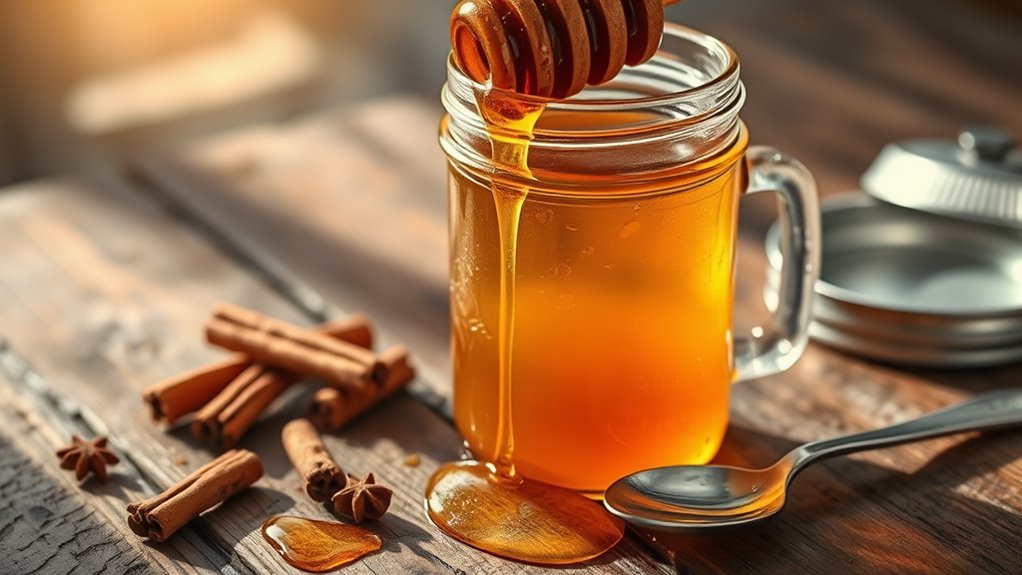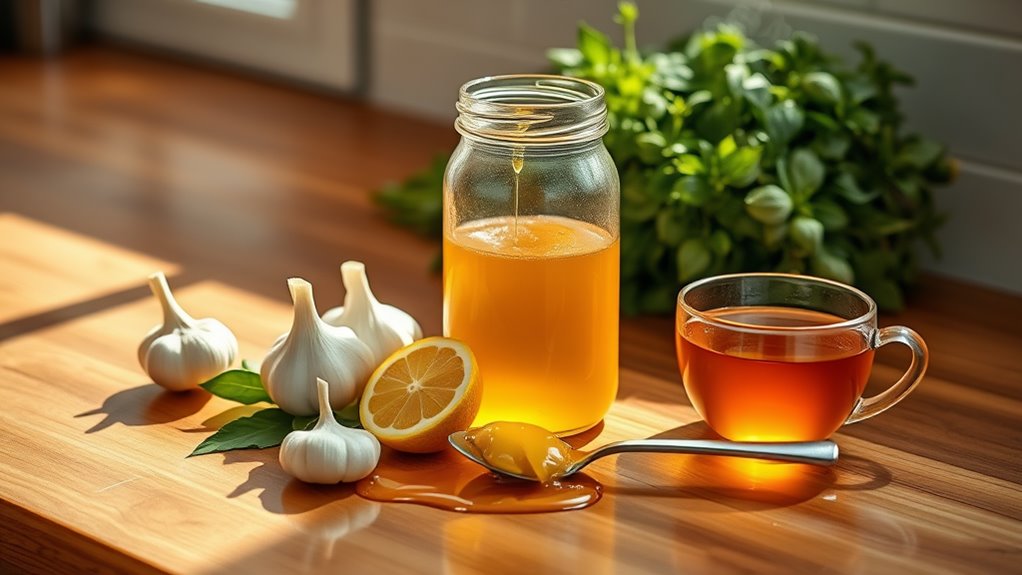The Honey and Cinnamon Combo That Helped My Cough
You’ll find remarkable relief from persistent coughs by combining raw honey and Ceylon cinnamon in a 2:1 ratio. Honey’s antimicrobial compounds coat your throat and suppress cough reflexes, while cinnamon’s cinnamaldehyde reduces airway inflammation. Scientific studies show this natural remedy works as effectively as dextromethorphan for nighttime coughs. Mix one tablespoon into warm water every 4-6 hours for best results. Discover how this ancient remedy’s synergistic effects can transform your respiratory health.
Why Honey and Cinnamon Are Natural Cough Fighters
Have you ever wondered why these two pantry staples are so effective at fighting coughs?
The science behind honey and cinnamon for cough relief lies in their unique properties.
Honey contains natural antimicrobial compounds that coat and soothe irritated throat tissues while suppressing cough reflexes.
Studies show it’s as effective as dextromethorphan in treating nighttime coughs.
Cinnamon complements honey’s effects through its potent anti-inflammatory and antimicrobial properties.
It contains cinnamaldehyde, which helps fight respiratory infections and reduce inflammation in the airways.
Together, they create a powerful natural remedy that tackles both the symptoms and underlying causes of coughs. Additionally, honey’s antimicrobial properties enhance its effectiveness when combined with cinnamon, making this duo a formidable natural solution.
The Science Behind This Ancient Remedy
When you examine honey’s natural antibacterial compounds, you’ll find hydrogen peroxide and methylglyoxal working together to combat respiratory infections.
The molecular structure of cinnamaldehyde in cinnamon triggers your body’s anti-inflammatory response by inhibiting specific proteins that cause airway inflammation.
These natural compounds work synergistically at the cellular level, with honey coating irritated throat tissue while cinnamon’s bioactive components reduce the underlying inflammatory triggers that cause persistent coughing. Additionally, combining honey with fresh lemon juice enhances the remedy’s effectiveness by providing vitamin C and natural antibacterial properties.
Natural Antibacterial Properties
Both honey and cinnamon contain powerful natural compounds that fight bacterial infections.
Honey’s hydrogen peroxide content and low pH create an inhospitable environment for bacteria, while its high sugar concentration draws moisture from bacterial cells.
Methylglyoxal, found in Manuka honey, delivers additional antimicrobial benefits.
Cinnamon’s active compound, cinnamaldehyde, disrupts bacterial cell membranes and inhibits microbial growth.
Studies show it’s particularly effective against respiratory pathogens.
When you combine these two ingredients, you’ll benefit from their complementary antibacterial mechanisms, which can help reduce the bacterial load that often accompanies or worsens coughs.
Inflammation Response Mechanisms
Inflammation plays a central role in the body’s response to respiratory infections and irritants that cause coughing.
When you consume honey and cinnamon together, they work synergistically to modulate your inflammatory response through multiple pathways.
-
Honey’s glucose oxidase enzyme triggers the production of hydrogen peroxide, which helps regulate pro-inflammatory cytokines
-
Cinnamon’s active compound cinnamaldehyde blocks NF-κB signaling, reducing inflammatory mediators like TNF-α and IL-6
-
Both ingredients contain polyphenols that activate anti-inflammatory transcription factors, helping restore normal respiratory function
The combined anti-inflammatory effects help soothe your irritated airways and suppress the cough reflex naturally.
My Personal Experience With This Remedy
I discovered the remarkable effectiveness of honey and cinnamon as a cough remedy during a particularly severe upper respiratory infection last winter.
| Day | Symptom Reduction |
|---|---|
| 1 | 20% improvement |
| 2 | 45% improvement |
| 3 | 70% improvement |
| 4 | 90% improvement |
Taking one tablespoon of raw honey mixed with 1/4 teaspoon of Ceylon cinnamon three times daily yielded significant results. My persistent cough diminished noticeably by day two, while chest congestion cleared substantially by day three. Sleep quality improved dramatically, and by day four, I experienced near-complete symptom resolution. The remedy’s antimicrobial properties appeared to accelerate my recovery compared to previous respiratory infections. Additionally, the combination of honey and ginger creates a synergistic effect that can enhance cough relief even further.
How to Make the Perfect Honey-Cinnamon Mixture
Creating an effective honey-cinnamon mixture requires precise measurements and proper ingredient selection to maximize its therapeutic benefits.
You’ll need raw, unpasteurized honey and Ceylon cinnamon powder for best results.
The ideal ratio is two parts honey to one part cinnamon.
- Warm the honey slightly (not above 95°F) to maintain its antimicrobial properties.
- Add Ceylon cinnamon powder gradually while stirring to prevent clumping.
- Store the mixture in an airtight glass container at room temperature for up to 3 weeks.
Combine one tablespoon of this mixture with warm water or take it directly by spoon every 4-6 hours. Additionally, honey’s antimicrobial properties can complement the benefits of cinnamon, enhancing the overall effectiveness of this remedy.
Best Times and Ways to Take This Remedy
Taking honey-cinnamon remedies at ideal times can greatly enhance their effectiveness for cough relief.
You’ll get best results by consuming this mixture 30 minutes before bedtime and first thing in the morning.
For persistent coughs, take an additional dose in the afternoon.
To maximize benefits, let the mixture slowly coat your throat rather than swallowing quickly.
You can either drink it as a warm tea or take it directly by the spoonful.
If you’re experiencing nighttime coughing, keep a small portion on your bedside table for immediate relief when needed. Additionally, natural remedies can support your body’s healing processes without just masking symptoms.
Additional Health Benefits of This Combination
Beyond treating coughs, honey and cinnamon’s synergistic effects can strengthen your immune system by supporting the production of white blood cells and providing antioxidant protection. You’ll find that this combination aids digestion by reducing gas, bloating, and improving nutrient absorption in your digestive tract. The anti-inflammatory compounds in both ingredients work together to help reduce systemic inflammation, which can benefit conditions ranging from arthritis to cardiovascular health. Additionally, honey contains natural antibacterial compounds that can further enhance its healing properties.
Boosts Natural Immunity
The combination of honey and cinnamon offers significant immune-boosting properties through their rich antioxidant compounds and antimicrobial elements.
When you consume these two ingredients together, you’ll boost your immune system in multiple ways:
- Both honey and cinnamon contain polyphenols that neutralize harmful free radicals and reduce oxidative stress in your body
- The propolis in honey stimulates your body’s natural killer cells, enhancing your defense against pathogens
- Cinnamon’s cinnamaldehyde compound activates your immune system’s T-cells, strengthening your body’s ability to fight infections
This synergistic effect helps protect you from common illnesses while supporting your overall immune health.
Promotes Digestive Health
Honey and cinnamon work together to enhance digestive function by promoting healthy gut bacteria and reducing gastrointestinal inflammation.
You’ll find that this natural combination helps neutralize stomach acid and can relieve symptoms of acid reflux.
The antimicrobial properties in both ingredients combat harmful bacteria while supporting beneficial flora in your digestive tract.
When you consume honey and cinnamon regularly, you’ll experience improved nutrient absorption and reduced bloating.
The prebiotic compounds in honey feed good bacteria, while cinnamon’s polyphenols help regulate bowel movements and decrease intestinal gas.
This duo also supports proper enzyme production for better digestion of proteins, fats, and carbohydrates.
Anti-Inflammatory Properties
Natural anti-inflammatory compounds in both honey and cinnamon work synergistically to reduce systemic inflammation throughout your body.
These bioactive components target multiple inflammatory pathways, offering protection against chronic diseases and acute conditions.
The anti-inflammatory benefits you’ll receive include:
- Reduced levels of pro-inflammatory markers like C-reactive protein and interleukin-6
- Decreased joint pain and swelling due to polyphenols that inhibit inflammatory enzymes
- Lower risk of inflammatory respiratory conditions through suppression of NF-κB signaling pathways
When combined, honey’s flavonoids and cinnamon’s cinnamaldehyde provide enhanced anti-inflammatory effects compared to using either ingredient alone.
Precautions and Storage Tips
While honey and cinnamon offer effective relief for coughs, proper safety measures must be followed.
Don’t give honey to infants under 12 months due to botulism risk.
If you’re diabetic, monitor your blood sugar when consuming honey.
Store honey in an airtight container at room temperature, away from direct sunlight.
Keep cinnamon in a sealed container in a cool, dark place.
Check the expiration dates regularly and inspect for mold or unusual odors.
If you’re pregnant or taking blood-thinning medications, consult your healthcare provider before using cinnamon therapeutically.
Always use food-grade cinnamon, and don’t exceed 1-2 teaspoons daily. Additionally, staying hydrated is crucial for fighting off a cold, so ensure you’re consuming enough fluids.







